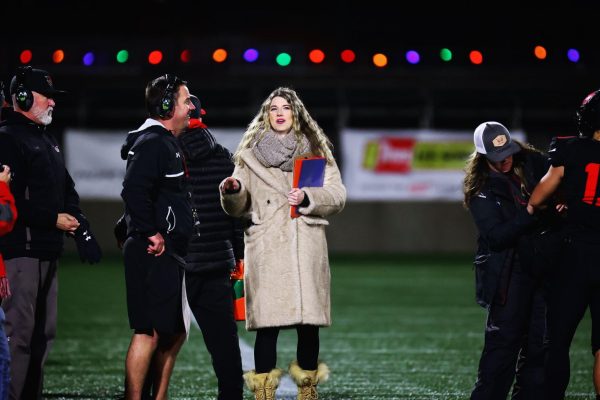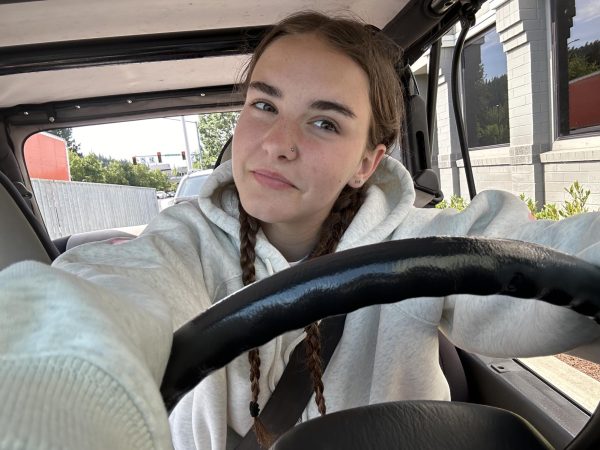
Disclaimer: The views and opinions expressed in this forum article are those of the author, and are not endorsed by the Franklin Post or Franklin High School.
“You play like a girl. You could never beat me, I’m so much stronger than you. Well, men are biologically superior, there’s no competition. Oh really, you’re a sports journalist? Do you really like sports? I bet you’re just doing it for male attention. So you like this team? Well, I bet you couldn’t name five players. I bet you only watch football because of Taylor Swift. You’re never going to be taken seriously. Women shouldn’t be in sports.”
These phrases have been thrown out far too many times to women in sports media, myself included. Sexism still runs rampant in our world today, but especially within sports. Sports has always been seen as a male-dominated field, whether that be participating in athletics or working in the media. Although incredible strides have been made by female athletes, coaches, journalists, and broadcasters in the last few decades, there is still an ongoing battle with gender-based discrimination. Women in sports constantly go above and beyond to prove themselves in ways their male counterparts have never had to.
From a young age, I have always loved sports. I loved sitting on the couch and watching hockey with my dad, attending my brother’s baseball games, and playing softball. I was so intrigued by the immense level of skill I saw at the professional level, as well as by the dedication young athletes like myself had to developing their skills. Despite playing softball in my youth and swimming competitively during high school, I knew I would never be a professional athlete. I quickly lost my passion for softball, and in swimming, I was burdened with injuries that forced me to sit out for most of my senior season. I have never been upset by knowing I would not “go pro” because I always held onto the hope that sports would become a part of my life differently in the future.
Growing up in the Bay Area, I have always been an avid San Francisco Giants fan. While watching, I saw Sideline Reporter Amy Gutierrez recap games or interview players, and I began to look up to her. Initially, I was desperate to live in her shoes so I could meet and talk to players like Buster Posey or Brandon Crawford, but I came to realize that I was equally intrigued by the idea of working in professional sports or sports media.
Brenna Greene has been a sports anchor and reporter for KOIN for the last three out of her 11 years in the TV industry. She has always loved sports and loves “being able to tell other people’s stories. It’s so inspiring and just something I find great joy in.” However, despite the love she has for her job, it is still incredibly difficult. Many have questioned her abilities or blatantly disregarded her talents because she is working in sports media as a woman.
Greene explained, “You will have to work twice as hard as the guys to get what you want in this job.” While she believes things have gotten better since she first joined the industry, it “doesn’t mean [she doesn’t] deal with sexism on a weekly or bi-weekly basis.” Sexist occurrences are not only the experience of Greene but of so many women in similar positions.
Women in sports media, especially those who are on TV as anchors or sideline reporters, are often judged for their appearances far more than any of their male counterparts. When you google “female sports broadcasters” the related searches add “hottest” or “best looking” before it. In comparison, when searching “male sports broadcasters” the only added word before is “famous.” This shows how oversexualized women in sports media are compared to men, and even on a search engine, it is incredibly prevalent.
Greene faced this heavily in her first TV market in Montana, where male colleagues would constantly hit on and sexualize her. “People can forget you’re a human and instead start treating you as an object,” said Greene.
I have been a part of the Franklin Post for the past three years, and my intrigue for sports media has blossomed here. This community, forged in a mutual love for writing and inquiry, welcomed me with open arms. During my first year, I came to realize how much I enjoyed writing for the sports section of the paper. I loved getting the chance to write about the accomplishments of athletes my age or at the professional level, seeing the love and dedication they have towards their sport. This ultimately encouraged me to apply for and become a sports editor, which I have now been for the last two years. During this time, I have been able to write and edit numerous incredible stories, widening my understanding of specific sports or individual athletic contributions to their profession or community. This cemented my love for the sports world, that has always held my attention in one way or another.
As I reflect on my time in sports journalism, I wanted to highlight the importance of women whose impacts or contributions to sports media may be overlooked. This is a topic that has been on my mind for many years and feels especially relevant to me — as a graduating senior, I am more impassioned than ever to pursue sports media in my future.
Men and women in the same positions should not continue to be held to different standards or treated differently because of their gender. The environment that exists for women in sports media is unacceptable and needs to be radically changed. This change can start by empowering women to take hold of positions in sports media and holding media companies accountable for creating a positive work environment for all.
Greene is a professional in sports media, but similar treatment is also experienced by those who have not yet broken into it. Sophie Fowler is a student at the University of Oregon (UO) who works at UO Athletics in sports broadcasting. As a journalism major and sports lover, Fowler was eager to emerge into the world of sports media. However, she has also struggled with having to prove herself more than her male counterparts: “I have had [female] peers in similar roles as myself who have not been treated as seriously when directing and producing games.”
She acknowledged that there has been more space for women in sports in recent years, but there is still a lot of room for growth. She explained, “Working with the Big-10 and PAC-12 for athletic games, I have seen more and more women get to hold jobs such as sports broadcaster, or working behind-the-scenes for camera, or replay, and to see that shift in roles has been really cool.” She also believes that “as roles in sports journalism continue to grow and hold space for women … there will be more roles for women.”
The incredible women I had the privilege of speaking to or reading about for this article fill me with hope for a time when their work and efforts in this field will be fully recognized. There are so many women in sports media making revolutionary contributions, and even more that hope to make a difference in the future. It is more important than ever that all individuals in sports media continue to work for an equal playing field. Women will always belong in athletics and sports media, and we will fight until we gain true equality. But most importantly, we will fight like a girl.



































